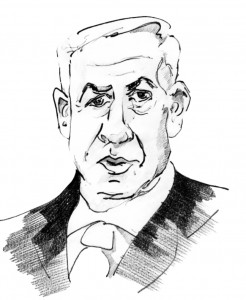U.S. and Germany are indispensable allies for the security of Jerusalem, but PM Netanyahu must accept an independent Palestinian State, Rafael Seligmann writes in this Commentary.
It was in the Middle East, in Israel and Arabia, where the Bible and the Koran were written. This is where Moses, Jesus and Mohammed lived, wandered and taught. It is also the region where the great tales of the Arabian Nights were first told. Despite this, the politics in the region is anything but romantic.
Like everywhere else, politics in this part of the world is based on interests, power and occasionally violence. Even foreign powers like the United States, Germany and Russia take their lead in the region from legitimate interests.
An Independent Palestinian State
One year ago, in its inaugural edition, the Jewish Voice from Germany urged the Israeli government to take the initiative and be the first to recognize a Palestinian state. This would not have been as revolutionary as it sounds. During a speech at the Bar Ilan University in 2009, Premier Netanyahu had already acknowledged a de facto independent Palestinian state with which Israel wanted to peacefully coexist.
As it turns out, Netanyahu lacked both the political power and will to force his rightwing coalition partners to recognize this fact. A coalition with the liberal Kadima party could have been an alternative, but Netanyahu feared for position as premier. And so he permitted the building of settlements in the occupied territories to continue until Washington’s patience ran out.
The result has been the erosion of Israel’s relationship with its staunchest ally and a missed opportunity for Jerusalem to take the initiative.
Israel’s security is not negotiable
For Germany Israel’s security is not negotiable The U.S. and Israel both voted “No” to the proposed ‘Observer Status’ for Palestine at the UN General Assembly in December. The vote was nevertheless a fiasco for Israeli diplomacy. A whole nine countries voted “No”. The overwhelming majority, 138 of 193 member states, supported the proposed new status for Palestine. Germany abstained.
This provoked angry responses from within Israel, many had expected Berlin to vote “No”. And this even though Germany had made it clear beforehand that it rejects Jerusalem’s settlement policy in the occupied territories. After it lost the vote, the government in Jerusalem gave the go-ahead to a further 3,000 housing units on Palestinian land.
With its inflexible political outlook, Israel is drifting ever further into global political isolation. “For Germany, Israel’s security is not negotiable” affirmed German Chancellor Angela Merkel before the Knesset.
Berlin wants to help
Berlin wants to help Israel to reconcile with the moderate Palestinians centered around President Abbas. Jerusalem needs to take these gestures seriously. Israel is located at the center of the Arab world. The countries around it have been caught up in revolutionary upheaval for the past two years. Initially everyone applauded the swift triumph of freedom and democracy across Arab North Africa.
This reveals a deep misunderstanding of both history and religion. Whether they occur in America, Europe or the Levant, revolutions need decades to bring greater freedom into the world. In the Arab world, there is a fundamental lack of democratic structures and an insuffi ciently broad middle class, millions are illiterate.
The pervading power of the military, one party rule, and feudal regimes are doggedly fi ghting to survive. In Egypt, the Muslim Brotherhood has tried to effect a furtive coup d’état to take power. And they have the majority of Egyptians behind them. Resistance to this dictatorship is coming from the urban middle-class.
Morsi is a consummate Power Politician
Volatile neighbors force the need for rational policy President Morsi is a consummate power politician. He turned a blind eye when rockets from Iran were smuggled into the Gaza Strip, a lawless enclave under the control of Hamas. Hamas itself is a Brotherhood franchise in this small strip of land. When Israel answered the volleys of rockets from Gaza with military strikes, Morsi, under pressure from Washington, helped negotiate the ceasefire.
At the time, Morsi was lauded for his actions in the Western press as a “reliable peacemaker.” The democratically minded citizens of Cairo and Alexandria know Morsi better than this and they will not let themselves be deceived by his tactical maneuvers. They are now on the streets fi ghting for freedom. It is not unlikely that the army will have a decisive say in the outcome perhaps even bringing a new Nasser to power.
Meanwhile, just across the Mediterranean, Bashir al-Assad’s Alawite military and Ba’ath dictatorship is fighting brutal campaign to stay in power. His enemies are his citizens as well as Islamic extremists and jihadists. Assad is supported by both Iran and Russia. In Tehran, the Ahmadinejad and religious factions are at odds with each other, unanimous only in their desire to destroy Israel. Tehran, for its part, is busy creating a nuclear strike capability in order to pursue that goal.
Under threat by Iran
The US and Germany can play an important role Strategically speaking, the Jewish State is under threat by Iran and not President Abbas in Ramallah. After the elections are over in January, Israel needs to implement rational diplomatic and security policy. As part of this, Israel should bring its political policies into line with the interests of the US and Germany, its closest partners.
The only Way
This is the only way for Israel to secure its permanent existence in this troubled region. This will come at a price, the abandonment of the settlements in the West Bank and some further risks. The prize could be the gradual emergence of a peace in the region. NATO’s Islamic member Turkey could play a signifi cant and constructive role in this process. This presupposes of course that Ankara and Jerusalem can put their current dispute to one side and agree to some form of facesaving agreement. Germany and the US could help instigate this rapprochement.

